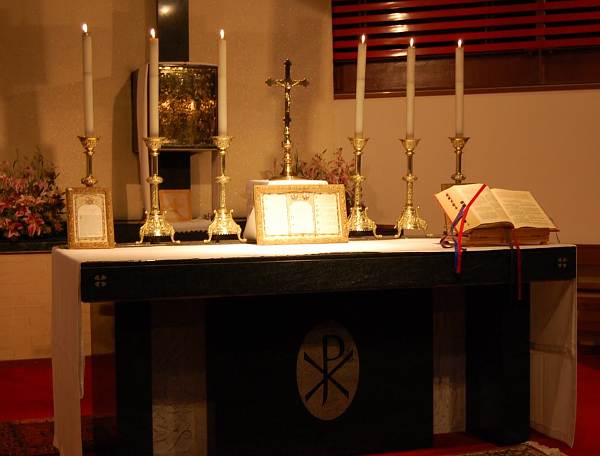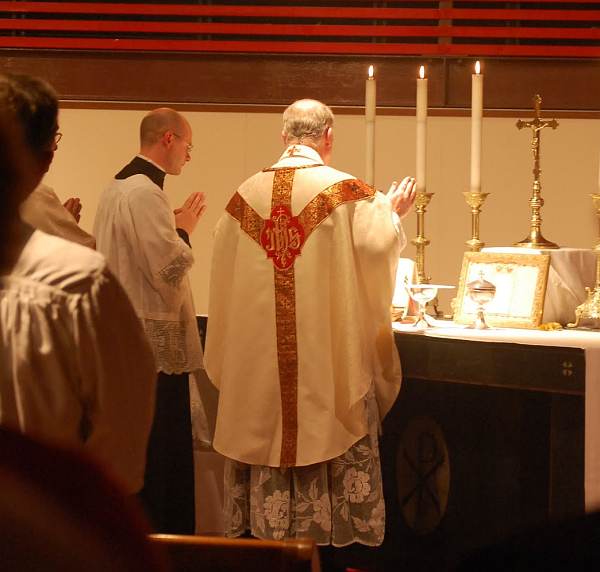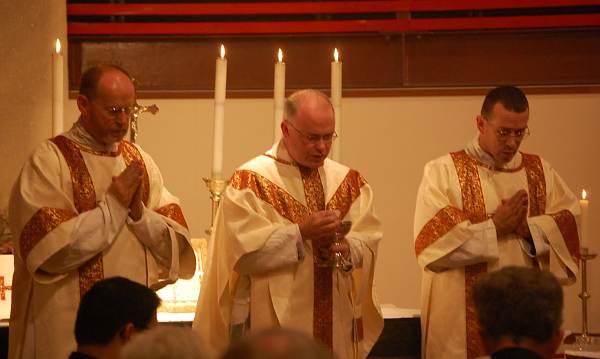Bilder fra en Missa solemnis i England 24. september.



En engelsk prest, Fr Sean Finnegan, skriver på sin blog:
On the 24th September, mirabile dictu, I will have been a priest for 20 years. … I feel that the occasion is not without significance, so there will be Solemn High Mass in the Extraordinary Form in St Peter’s, Shoreham at 7.30pm on Thursday 24th September, Feast of our Lady of Ransom and Walsingham. All, and I mean all, are very welcome. Especially if you know me, please come, if you have nothing better to do, and forgive the lack of a particular invitation.
There will be a little celebration afterwards … Those who feel that the Extraordinary Form is slightly strong meat are very welcome instead to gather with me (and concelebrate, if they wish) at 11.30am on the same day, at Christ the King, Steyning, where I will celebrate Mass in the Ordinary Form, and there will be also nibbles and something to drink in the parish room after.
England har en del vanlige, katolske menighetsprester, som er svært opptatt av den gamle liturgien – denne presten som var med på jubileet og denne. Kan noen forklare hvorfor den tradisjonelle latinske messen ser ut til å stå sterkere i England enn i de fleste andre land – dvs. i vanlig menighetssammenheng, ikke i utbrytergrupper?

Den står sterkere på grunn av den såkalte «Agatha Christie-indulten» som kardinal Heenan ordnet i sin tid. Heenan var han som, etter å ha bivånet en Novus Ordo ad experimentum i 1968, uttalte at «If this becomes the norm of Mass, we will soon be left with only women and children in church».
Han ante ikke hvor profetisk han var.
Noen grunner at den tradisjonelle latinske messen oppleves som mindre suspekt i England enn på kontinentet kan være at
1) Høytidelige messer med verdens beste guttekor (både anglikanske og det katolske Westminster Cathedral Choir), og muligheten for pomp og prakt føles naturlig og godt for engelskmenn;
2) TLM har ingen åpenbare politiske assosiasjoner i England, slik de har i Frankrike (Lefebvre ble knyttet til Le Pen, visstnok fordi Le Pen var den eneste politiker som var mot abort);
3) Novus Ordo har tyske røtter, noe som kanskje skaper mindre gjenklang i engelske sinn;
4) Allerede for lenge siden har de engelske dominikanernes store lærer, salig fr. Herbert McCabe OP (som var selverklært marxist), påpekt at mye gikk tapt ved å gå bort fra den gamle messen
5) Fremstående britiske forfattere som Evelyn Waugh og J. R. R. Tolkien (ok, jeg vet han var født i Sørafrika) var blant dem som var kritiske til den nye messen og avskaffelsen av latin.
Her kan man naturligvis bare spekulere, men… man kan vel aldri forvente at engelskmenn vil reagere på samme måte som amerikanere, tyskere eller franskmenn? Akkurat som vi nordmenn, igrunnen :-)
I am so sorry not to be able to speak or write Norwegian, but I am very touched that you troubled to post these pictures of my priestly celebration. You ask (if I have understood you correctly) why it is that this form of Mass is celebrated in England more than in other countries, and attended not by special groups, but by ordinary Catholics.
Partly, this is historical: In England, the Reformation was resisted more strongly than in other countries, as perhaps you know, and the forms of worship of the wider Church were valued very highly. Also, when the Novus Ordo Missæ was introduced, a large number of the intelligentsia of England petitioned Pope Paul VI for permission to continue to use the old Mass on occasion, a permission that was granted. England was the only country in the world to have this permission, called the ‘Agatha Christi Indult’, because Agatha Christi was one of the first signatories. Consequently, there has been, since the early 1970s, a constant tradition in England to use this liturgy, albeit only occasionaly.
Another reason is simply that this form of the Mass is more prayerful, and when people encounter it, they like it. It speaks to them of God in a way that the usual Mass that I celebrate for them does not. On an ordinary day, we have a Mass very much as it is celebrated elsewhere in the world. It is only occasionally that we celebrate like this. The change, I think, does people good.
All this being said, it is also true that in the United States, you will find an even greater adherence to the traditional liturgy.
God bless you all, and thank you for your kind interest.
Fr Seán
I am amazed that you are able to read Norwegian, because you did understand the question I asked.
In Norway I find that the tension around and negative attitude towards the old mass are greater that I hoped it would have been – after these two years. But then the old old mass was hardly ever used here until 2007, except by a very small group of SSPX-followers.
I found the pictures from your anniversary interesting for several reasons, one of them is that I have started to plan my own 10th ordination, 8 January 2010. The plans so far are for a bit simpler Missa cantata.